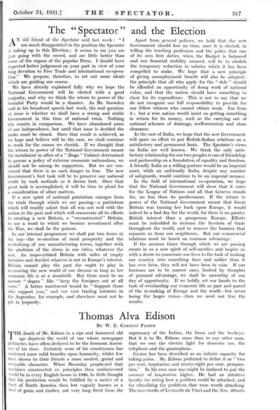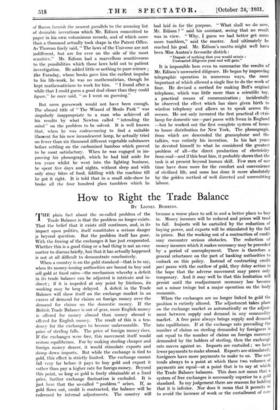Thomas Alva Edison
By W. E. GARRETT FISHER THE death of Mr. Edison in a ripe and honoured old age deprives the world of one whom newspaper plebiscites have often declared to be the foremost Ameri- can of his time. Certainly none of his countrymen has conferred more solid benefits upon humanity, whilst few have shown to their friends a more modest, genial and estimable character. When Macaulay prophesied that machines constructed on principles then undiscovered would be. in every English house in 1980, he little thought that his prediction would be fulfilled by a native of a tract of North America then but vaguely known as a land of grain and timber, not very long freed from the supremacy of the Indian, the bison and the buckeye. But it is to Mr. Edison, more than to any other man, that we owe the electric light for domestic use, the telephone and the gramophone.
Genius has been described as an infinite capacity for taking pains. Mr. Edison preferred to define it as " two per cent. inspiration and ninety-eight per cent. perspira- tion," In his own case one might be inclined to put the amount of inspiration higher. He had an intuitive faculty for seeing how a problem could be attacked, and for visualizing the problems that were worth attacking. The note-books of Leonardo da Vinci and the New Atlantis of Bacon furnish the nearest parallels to the amazing list of desirable inventions which Mr. Edison committed to paper in his own voluminous records, and of which more than a thousand actually took shape in the Patent Office. As Thoreau finely said, " The laws of the Universe are not indifferent, but are for ever on the side of the most sensitive." Mr. Edison had a marvellous sensitiveness to the possibilities which those laws held out to patient investigation. He added little or nothing to pure science ; like Faraday, whose books gave him the earliest impulse to his life-work, he was no mathematician, though he kept mathematicians to work for him. " I found after a while that I could guess a good deal closer than they could figure," he once said, " so I went on guessing."
But mere guesswork would not have been enough. The absurd title of " The Wizard of Menlo Park " was singularly inappropriate to a man who achieved all his results by what Newton called " intending the mind " on the problem to be solved. It is well known that, when he was endeavouring to find a suitable filament for his new incandescent lamp, he actually tried no fewer than six thousand different vegetable substances before settling on the carbonized bamboo which proved to be most satisfactory. When he was engaged in im- proving his phonograph, which he had laid aside for ten years whilst he went into the lighting business, he spent five days and nights, without sleep and with only stray bites of food, fiddling with the machine till he got it right. It is told that in a small side-show he broke all the four hundred glass tumblers which he had laid in for the purpose. " What shall we do now, Mr. Edison ? " said his assistant, seeing that no result was in view. " Why, I guess we had better get some more tumblers," said the master. And ultimately he reached his goal. Mr. Edison's motto might well have been Miss Austen's favourite distich
" Despair of nothing that you would attain : Unwearied diligence your end will gain."
It is impossible here even to summarize the results of Mr. Edison's unwearied diligence. He began by improving telegraphic operation in numerous ways, the most important of which allowed a single line to do the work of four. He devised a method for making Bell's original telephone, which was little more than a scientific toy. a practical means of communication ; incidentally he observed the effect which has since given birth to wireless telephony and allows us to speak across the oceans. He not only invented the first practical el ctrie lamp for domestic use—pari passu with Swan in England —but he worked out the first complete system of house to house distribution for New York, The phonograph, from which are descended the gramophone and the talkies, was entirely his invention. In his last years he devoted himself to what he considered the greatest problem of all—the direct production of electricity from coal—and if this beat him, it probably shows that the task is at present beyond human skill. Few men of our time have done more for the comfort and convenience of civilized life, and none has done it more absolutely by the golden method of well directed and unremitting labour.















































 Previous page
Previous page